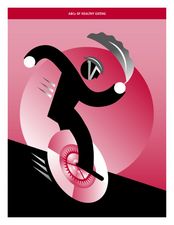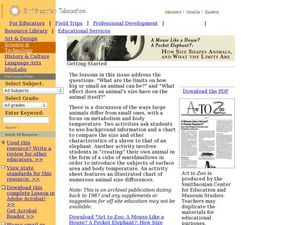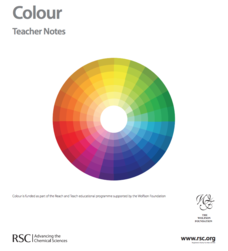Curated OER
Hand Sensitivity
Students experiment with the sense of touch. In this tactile lesson, students determine the most sensitive area of the hand. Students experiment by describing objects through touch only. Students compare the amount of sensory data...
Curated OER
What Makes Bones Strong?
Students explore the function of bone, muscle, and skin. Pasta and rubber bands are used to model how minerals and collagen contribute to bone strength. The effects of the reduction of these substances are explored in chicken bones.
Curated OER
Ft. Vancouver Fur Trade: a Skin for a Skin
Students examine political presence of Hudson's Bay Company, explore economic impact of European demand for beaver pelts and the fur trapping trade, and practice counting in Chinook Jargon.
Curated OER
Beauty is More Than Skin Deep: Examining the Positive and Negative Depictions of Physical Appearance in Children's Films
Third graders compare and contrast different versions of the same story. They recognize our differences, identify qualities that make us special and unique individuals, and create a 'Wanted' poster illustrating a special quality.
Curated OER
The Nervous System and the Effects of Drugs
In this senses worksheet, students use webbed information to answer several questions. Students read about each one of the five human senses in order to demonstrate an understanding of the material.
Curated OER
Plant Life Cycles
Follow the life cycle of a dandelion with a lab sheet for kindergartners. They learn about the order of events in a dandelion's life, then put the stages of life in order. Can they describe the life cycle of a pumpkin? For extra...
Curated OER
Genetic Disorders
Students examine how living cells create new cells and how genetic mutations can cause disorders and be inherited. In this genetic reproductionn lesson students create their own PowerPoint presentation.
Curated OER
You've Got to Have Heart
After reading an excellent description of the human heart, fifth graders look at a drawing of a human body, and choose the circle they think represents where the human heart is found. There are four circles inside the character's chest....
Curated OER
Anatomy and Physiology "Quickies"
Students use a variety of creative writing tools within this assignment: poems on particular organ systems, write a short story and/or create a word graph. They are involved in a demonstration of lactic build up in the muscles, a...
Curated OER
Artificial Heart Technology
Students discover the basics of the human heart and how it functions. They examine the whole circulatory system and how an electric heart would work inside the human body. They can choose to perform their own surgery by following...
Curated OER
The Empirical Challenges of Racial Classification
This lesson plan will help students examine their preconceptions and assumptions about racial categories and understand the impossibility of constructing a consistent system of human racial classification.
Curated OER
Nerve Cell Informercials
Students research the structure and function of the nervous system. They prepare a model or representation of neural transmission. Students create an infomercial about nerve cells.
Curated OER
The Abc's of Healthy Eating
Students examine healthy eating as it relates to physical and mental health. In this the abc's of healthy eating instructional activity, students discuss the effects of unhealthy eating habits. Students examine the My Pyramid Food...
Curated OER
Body Battles!
Seventh graders explain the role of white blood cells in fighting infections. In this life science instructional activity, 7th graders create flow charts showing the immune response process. They act out and play a game to simulate...
Curated OER
Frogs
Students explore the external and internal structures of an amphibian and how frog anatomy compares to human anatomy. They collect pictures of a frog using a digital camera, create a web page, develop a PowerPoint presentation, and...
Curated OER
How Size Shapes Animals
Students investigate how size affects large and small animals differently. In this animal lesson plan, students determine how size affects different animals by constructing their own animal out of marshmallows. Once students create...
Curated OER
Fetal Pig Dissection
In this dissection worksheet, students use a preserved fetal pig to learn more about anatomical terms and body systems. Detailed diagrams and instructions are provided to guide the students through the dissection. Students complete 81...
Curated OER
Lymphatic and Immunity
For this biology worksheet, students identify and locate various vocabulary terms related to the lymphatic and immunity systems of the body. There are 42 biology terms located in the word search.
Curated OER
Titration: Standardization of a Base and Analysis of Stomach Antacid Tablets
Titration experiments don't have to give your high schoolers a stomachache. Study the ways to titrate an acide with a base in an engaging science experiment, which involves creating solutions and performing titrations. Pupils prepare a...
K12 Reader
Customs and Traditions
Here's a two-part reading comprehension worksheet that asks kids to read a short passage about the customs and traditions of Native American tribes and then to answer a series of questions based on the article.
Biology in Motion
Organize-It
Many pupils struggle to categorize and organize related content. Multiple quizzes on a variety of topics offer practice for these specific skills. Scholars move items around until they think each is placed in the proper position....
Royal Society of Chemistry
Colour—Gifted and Talented Chemistry
Add a splash of color to your chemistry class! Science scholars discover the principles behind color through a wide variety of hands-on activities. Lessons include dyes, chromatography, and flame tests.
Curated OER
Echinoderms
In this echinoderm worksheet, students will explore the characteristics of echinoderms including their body structures and larval stages. Then students will match the five classes of echinoderms to their descriptions. This worksheet has...
Curated OER
Echinoderms and Invertebrate Chordates
In this echinoderms instructional activity, students will read information about echinoderms and invertebrate chordates. Then students will compare their similarities and differences by completing 1 short answer question.

























